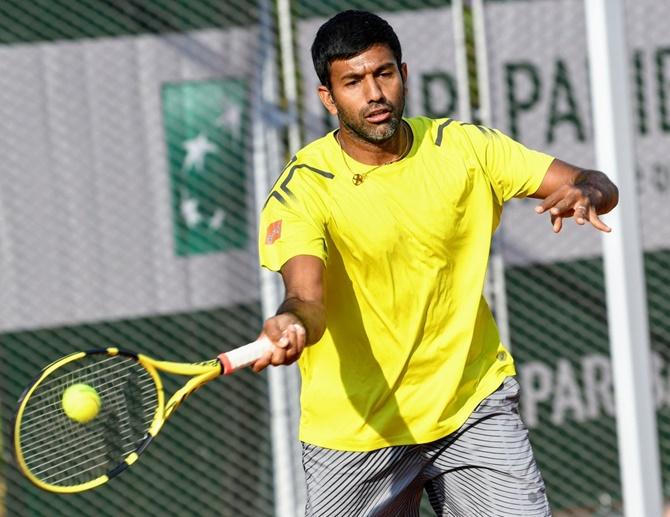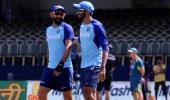Indian Davis Cup team sweats it out at 'mini cauldron', match timings revised due to tough conditions

Sweating profusely Rohan Bopanna says, "If I am sweating and changing my T-shirt during a training session, something is seriously wrong."
If Thursday's training session is an indication of what lies ahead for the Indian Davis Cup team in the World Group II tie against Morocco, it will not be an exaggeration to say that more than the rivals it's going to be the treacherous conditions that will test the fitness of the home players.
The severe humidity has turned the Mini Stadium into a 'mini cauldron'.
Bopanna's teammates know well that he does not sweat much, not even in hot and humid conditions of Chennai.
To drive home his point, the 43-year-old told PTI, "For the first time in 20 years, Bopanna is sweating. That means it's humid. I played five sets against Brazil in a singles match for four hours in one shirt, but here in half-an-hour (I am changing), it's not right."
Yuki Bhambri and Saketh Myneni swiftly looked for a shade after playing a few points and Ramkumar Ramanathan asked the team physio, Yash Pandey, to quickly hand him a gatorade drink.
"I want to stay hydrated," he tells Pandey.
The temperature is only 33 degrees, but it feels like 43. It had rained a few days back in the city, causing such conditions. Though the sun is not harsh, humidity is making it extremely hard for the players.
The heat coming off the court is also making the conditions worse.
In such tough weather conditions, a player loses about 2-3 litres of water every hour, along with essential electrolytes like sodium, chloride, potassium and magnesium.
"If the equal amount of water and electrolytes are not replenished, then within 30 minutes the performance will start dropping and eventually they cramp," explained Pandey, who is trying to ensure that the players stay fit and hydrated.
"As physiotherapists, our job is to make sure that the players perform at their peak and prevent any injuries. We are carrying electrolytes and salt tablets to maintain the water and electrolyte balance, using ice towels and ice packs to bring the body temperature down during practice," he said.
Debeshish Das, the other physio attached to the team, said: "Doing ice bath, set at around 10-12 degrees is required for recovery along with pool recovery work."
Considering the weather, the captains agreed to reschedule the match-timings, delaying it by two hours.
On Saturday, the matches will begin at 2 pm instead of 12 noon and on Sunday the matches will begin at 1 pm instead of 11 am.
While a two-hour delay is not expected to make much difference, India coach Zeeshan Ali says the decision still makes sense.
"The change in timing will definitely help the players who will be playing the second singles because what could have been a 2 pm start will now be a 4 pm start. The conditions are tough for both teams. It will come down to the fitness aspect. It will be a combination of fitness and tennis we are going to witness in the next two days," Zeeshan said.
Zeeshan said the players are professional, and adapting to different weather conditions should not be an issue.
"Whoever handles the heat better on the day will make the difference (in outcome)," the coach said.
Yuki said the conditions are certainly tough, but not the worst.
"We had faced similar challenges when the team had hosted Korea (April 2014) and the Czech Republic (September 2015)."











